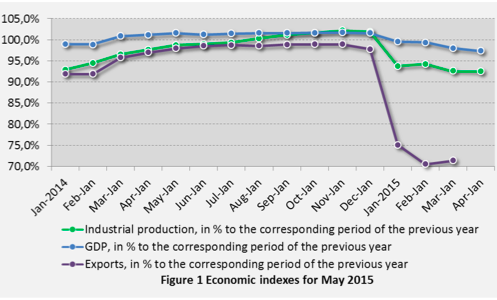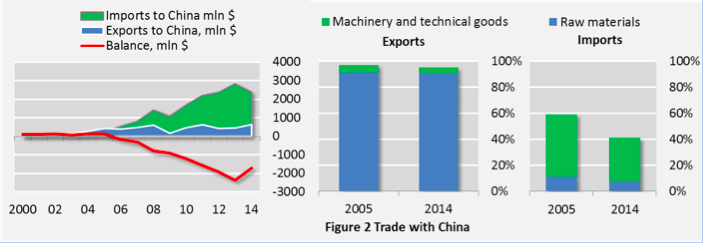Both an EU Partner and Russia’s Satellite? – Belarus Foreign Policy Digest

Vladimir Makei at the Riga summit
Two of the main events in Belarus' diplomatic life in May were China's presidents visit to Minsk and Belarus' participation in the Eastern Partnership summit – both of which have fitted well into Minsk' foreign policy priorities.
These priorities include developing alternatives to Russia's dominant role in the economic and security arenas and strengthening the country's economic viability through increasing exports and attracting investment.
The Belarusian authorities have largely managed to break free from their diplomatic isolation from Europe over the course of the past year. The joint declaration adopted at the Eastern Partnership summit in Riga includes several positive references to Belarus. They lay the ground for continued dialogue between Belarus and the West, which will include human rights issues, on the eve of the presidential election.
Austria and Hungary in Focus
On 4 May, Sebastian Kurz, the world's youngest foreign minister, came to Minsk from Austria on a working visit. Welcoming the Austrian minister, Belarusian president Alexander Lukashenka explained the reasons for Austria's strategy of maintaining closer relations with Belarus than most of its European partners. In the Belarusian ruler's opinion, the West has designated "curators" of former Soviet republics after the breakup of the USSR. Belarus fell into Austria's "zone of responsibility" and apparently has remained there ever since.
While this "sharing of responsibilities" may be a figment of Lukashenka's inventive mind, Vienna indeed has long been seeking closer economic ties with Minsk. During the last ten years, Austria has remained among the top five investors in the Belarusian economy, with annual investment varying within a range of $500,000 – 1mn. Some aspects of bilateral business, however, have led to scandals in Austria a few years back.
Hungary's foreign minister Péter Szijjártó visited Minsk a week earlier, on 28 – 29 April. While he was not lucky enough to meet with the Belarusian head of state, the top Hungarian diplomat held extensive talks with his counterpart Vladimir Makei. Péter Szijjártó has long been a driving force behind Hungary's Eastern Opening strategy, which has greatly facilitated the expansion of ties between Belarus and Hungary.
Hungary's foreign minister: The EU must reward Belarus for its stability and role in the Minsk agreements Read more
Minsk and Budapest agreed on a five-point action plan to expand cooperation in trade, investment and education. The two strongmen-led countries also share many conservative values, in particular, on safeguarding traditional family values and favouring interventionist policies with their economies.
Returning home from Minsk, Péter Szijjártó spoke out in favour of the EU changing its attitude towards Belarus and establishing close cooperation with Minsk in order to reward Belarus for its stability and the significant role it has played with the Minsk agreements.
Over the last month, Belarusian diplomats also held meetings in Minsk and other European capitals with senior-level diplomats from Austria, the Czech Republic, Finland, France, Germany, Poland, and Sweden.
Partnering with Europe
Besides bilateral issues, most meetings with European diplomats have focused on Belarus' forthcoming participation in the Eastern Partnership summit in Riga. Vladimir Makei also travelled to Luxembourg on 20 April and Bratislava on 15 May to discuss preparations for the summit with fellow ministers.
Both Europe and Belarus regarded the Eastern Partnership summit as an opportunity to strengthen various positive dynamics already in play with regards to their relations. While most European countries were psychologically ready to see Lukashenka coming to Riga, the Belarusian leader decided that the time was not yet ripe and sent Makei in his stead.
Some observers have interpreted Belarus' refusal to join in the quasi-unanimous condemnation of Russia's illegal annexation of Crimea in the summit's final document as evidence of Minsk's support of Russia's aggression and the insincerity of Belarus' rapprochement with Europe.
Belarus actively participated in an event, which Moscow sees as anti-Russian Read more
It would be foolish, however, to expect Minsk to endorse a language that would openly condemn its closest ally and sponsor. In fact, Minsk failed to prevent the inclusion of a rephrased reference to the illegal annexation of Crimea in the summit's declaration, though it could easily sabotage its joint adoption.
The very fact of Belarus' participation in an event, which a senior Russian diplomat called "negative", and its continued status as an EU partner at a time of very strained relations between Russia and Europe is very telling when one considers Belarus' true intentions. This is also true of Lukashenka's recent visit to Georgia, a country that has severed its diplomatic ties with Russia.
The summit's joint declaration highlights participating countries' appreciation of "the contribution of Belarus in facilitating negotiations" in the Ukraine crisis and welcomes "the steps taken in EU-Belarus relations". It also welcomes Belarus' accession to the Bologna Process and its initiative on a digital economy.
Prioritising Asia and the MENA region
China's president Xi Jinping paid a state visit to Belarus on 10 – 12 May. This was the first trip from China's dignitary to the country, one whom rarely receives the world leaders.
Does China need Belarus to conduct trade with Europe? Read more
Alexander Lukashenka outdid himself with his signs of hospitality that he extended to China's "paramount leader". The Belarusian authorities jumped at this opportunity to lure more Chinese investment into the country and get Beijing interested in importing more Belarusian goods.
The leaders of the two countries exchanged many compliments and signed numerous agreements paving the way to expanded economic cooperation. Some experts have expressed doubts about the strength of these agreements, particularly regarding China's genuine interest in Belarus' exaggerated offer of becoming a China's gateway to Europe.
Later in May, Alexander Lukashenka received parliamentary leaders from two Southeast Asian nations. On 22 May, Khin Aung Myint, the speaker of the upper house of Myanmar's parliament and a former general, agreed to Lukashenka's proposal to focus on a few priority areas. Belarus seeks to sell agricultural, mining and military equipment to this "discipline-flourishing democracy", as well as to train its military and civilian personnel.
On 25 May, the Belarusian president and Irman Gusman, the speaker of the regional chamber of Indonesia's parliament, discussed ways to radically increase the trade turnover between two countries, which now stands at about $215m. Belarus want to stake on establishing joint ventures of Belarusian mechanical engineering corporations in Indonesia. For his part, Irman Gusman promised to lobby an expeditious opening of an Indonesian embassy in Minsk.
In late April and May, deputy foreign minister Valentin Rybakov visited Mongolia, Algeria and Saudi Arabia and talked to a delegation from Iraqi Kurdistan in Minsk and his colleague Alexander Mikhnevich received a delegation from Oman. In all instances, diplomats paid primary attention to trade and economic cooperation.
Expanding Belarus' presence in new and less developed markets and maintaining positive dynamics in relations with the West, without alarming Russia, are set to remain Belarus' foreign policy priorities in the months preceding the forthcoming presidential election.






